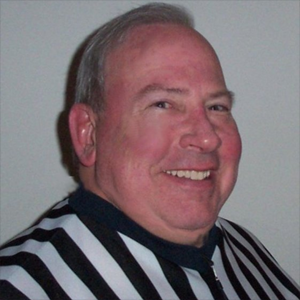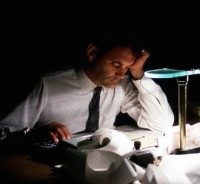
Rndballref
20 Years Experience
Chicago, IL
Male, 60
For twenty years I officiated high school, AAU and park district basketball games, retiring recently. For a few officiating is the focus of their occupation, while for most working as an umpire or basketball referee is an avocation. I started ref'ing to earn beer money during college, but it became a great way to stay connected to the best sports game in the universe. As a spinoff, I wrote a sports-thriller novel loosely based on my referee experiences titled, Advantage Disadvantage
Indirectly referees and the home school have the authority. In NFHS rules there is a function called home management. It is usually the athletic director, or a representative of the AD. The rule book states that in the absence of a designated home management person, the home team head coach will assume that function.
Directly from the rule book: The officials shall penalize unsporting behavior by player, coach, substitute, team attendant or FOLLOWER.
Further the book states: ... the officials may rule fouls on either team if its supporters act in a way to interfere with the proper conduct of the game.
It also cautions the officials to be careful applying penalties so as not to unfairly penalize a team.
When I officiated, I never engaged in an expulsion dialog with a fan. I simply went to home management (the AD) and said something like, "the guy in the third row with the blue shirt has to go. Home management always complied with my request and escorted the unruly fan out (or used an on site police officer to be the escort) and the AD often apologized about a overzealous home team fan.
I don't like the pro game because of how it has evolved, especially in the east. Post a big player on the block, slow the game down to half court, never full court press, winners are too predictable and players turn on/off hustle instead of playing hard the entire game. So I am with you. if I had to pick a player whose game I admire it would Kevin Durant. I despise how Wade, James and Bosh colluded to put their team together, and could have started a league-ruining trend. I like the college D1 game. There are upsets and coaches can piece together unique game plans to try to win. Much less predictibility.
Great question. In my career I have called very few T's on coaches. My approach is two-fold. 1) if the coach is working me up and down the court, I will talk calmly on a dead ball (never stop officiating on a live ball - ignore the coach). I will say, "coach, your constant rants are unwarranted, and may prevent me from doing my job. If it persists without specifics, I will be forced to call a "T" and have you seatbelted to the bench". 2) if the coach wants/needs to discuss a particular play on a dead ball, always in front of the bench, don't let the coach come on the court - walk him back to the bench, he will follow: a) I ask the coach what he saw on the play. If I saw something different, I tell him and explain that if I saw it his way, I would have called it his way, but I didn't.. b) If I saw the same thing, but believe he is misinterpeting a rule or a mechanic, I explain why I am calling it the way I did. For example, if a coach tells me that a player is camped out in 3 seconds and I have ignored it, I explain that I am applying advantage/disadvantage and will only call 3 seconds if it is material to the play - so he may be technically right, but that is my call. c) If I have booted the call, I admit it to the coach and tell him that since calling (or ignoring) a play, I have replayed it in my mind, and think I made an error. They always stop the harrassment when you admit an error. It is tough when you are young - they treated me differently as my hair grew gray than when I first started out - sure, my judgement improved, but also coaches usually try to push around young officials. In summary, ref the best you can. Be honest with yourself about blown calls, and have the strength to explain your calls - if you can't explain your calls, you should not be wearing the stripes.
In practice, an official can eject a fan anytime. Here is how it should work, At every game there is a home management function. That may be athletic director, coach or administration. If an official needs to eject someone, he/she should ask home management to eject the fan. If the official requests an ejection, home management should comply. If the official is out of control or unreasonable the home management should take that up after the game.
In my experiences, home management never refused to comply with an official's request to eject someone. If they did, I would have refused to continue to work the game.
Investment Banker
 What's a 100-hour work week like?
What's a 100-hour work week like?
Cruise Ship Officer
 Is the "women and children first" rule still in effect?
Is the "women and children first" rule still in effect?
Flight Attendant
 What kinds of passengers annoy you the most?
What kinds of passengers annoy you the most?
I was taught in this scenario to call a foul as soon as the post player starts a dribble or makes a move toward the basket (or shoots) . If the post player gives up the ball, pass on the foul call.
No, by rule a coach has only 2 places he/she can be: 1) standing (or squating) in a 14 foot area out of bounds, in front of his/her bench known as the "coach's box" in states that have adopted this optional provision, or 2) sitting on his/her bench.
In practice, unless a coach is over-bearing to the officials or is gaining advantage (for example standing near the endline and directing players) most referees are not going to focus on a coach outside the box. The penalty is a direct technical foul and most refs do well to ask or warn the coach before calling a T.
If a coach is called for any direct technical foul, he/she is "seatbelted" to the bench and loses the ability to stand in the coach's box for the remainder of the game.
Yes, of course the ref can. As I have addressed in prior questions, there is a Home Administration function (usually the athletic director, but always a representative of the home team). Home Administration is responsive to the referees needs including safety and timeliness. If a referee asks Home Administration to remove a fan, they will do it. Each referee has a different tolerance so it rarely happens. But if you get personal, or disrupt the game you should be tossed.
-OR-
 Login with Facebook
Login with Facebook (max 20 characters - letters, numbers, and underscores only. Note that your username is private, and you have the option to choose an alias when asking questions or hosting a Q&A.)
(A valid e-mail address is required. Your e-mail will not be shared with anyone.)
(min 5 characters)
By checking this box, you acknowledge that you have read and agree to Jobstr.com’s Terms and Privacy Policy.
-OR-
 Register with Facebook
Register with Facebook(Don't worry: you'll be able to choose an alias when asking questions or hosting a Q&A.)